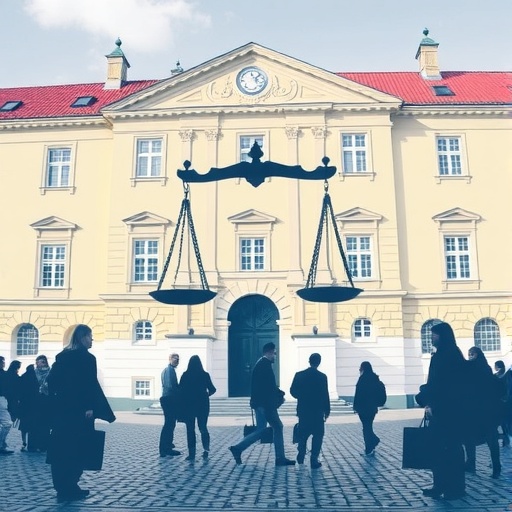In Serbia, access to justice has long been a critical issue, particularly regarding the availability of free legal aid. The need for comprehensive legal assistance resonates deeply within municipalities across the country, where many residents grapple with complex legal matters without adequate support. Recent research conducted by V. Turanjanin and A. Kovačević sheds light on the state of free legal aid services in Serbia, examining its accessibility and highlighting significant disparities that persist in the current system.
Municipal services play a pivotal role in regulating and providing legal assistance to those in need. The findings from the researchers indicate that while free legal aid is theoretically available, various systemic barriers prevent many individuals from accessing these essential services. The study illustrates that bureaucratic red tape, a lack of awareness about available resources, and limited outreach create obstacles for citizens seeking legal help.
The landscape of legal aid in Serbia can be described as fragmented. Various municipalities operate under different guidelines and funding levels, leading to inconsistent service availability across regions. This disparity amplifies the challenges faced by vulnerable populations, including low-income families, refugees, and marginalized communities. The research highlights the pressing need for standardized protocols that ensure equal access to legal aid services, regardless of geographic location.
One of the more alarming findings from the study is the underutilization of available legal aid services. Despite the existence of programs aimed at providing assistance, many citizens remain unaware of their rights or the resources available to them. The study indicates that outreach efforts must be intensified, focusing on educating the public about existing legal aid options and how to navigate the application process effectively. This is crucial for fostering a more just society where individuals can exercise their legal rights without fear of financial repercussions.
Moreover, the study identifies critical gaps in the training and resources allocated to legal aid providers within municipal systems. Legal professionals often experience heavy caseloads, leading to burnout and less effective advocacy for clients. The researchers advocate for enhanced training programs to equip legal aides with the necessary skills to handle diverse cases and provide high-quality support for their clients. Investing in the professional development of these individuals is paramount to improving the overall efficacy of the free legal aid system.
Collaboration between governmental and non-governmental organizations can also enhance the provision of legal aid in Serbia. The researchers suggest that partnerships can be forged to pool resources, share knowledge, and implement best practices for delivering legal support to underserved populations. Such collaborative efforts may help bridge the gaps currently present in the system, ensuring that vulnerable individuals receive the assistance they need.
Another critical point raised in the research relates to the financial constraints facing free legal aid services. The study points out that funding for legal aid programs is often inadequate, limiting their ability to support the growing number of individuals requiring assistance. A comprehensive analysis of funding models reveals that sustainable investment in legal aid is essential for maintaining and expanding these services to meet the public’s needs.
The impact of social media and technology on the provision of legal aid is also addressed in the research. The digital divide in Serbia means that not everyone has equal access to online resources or remote legal consultations. However, leveraging technology could streamline service delivery, making it easier for individuals to access legal advice when they cannot visit legal offices in person. The researchers encourage the incorporation of digital solutions to enhance accessibility for citizens, particularly in rural areas where legal services may be less available.
Turanjanin and Kovačević’s research not only outlines the current challenges plaguing free legal aid in Serbia but also contextualizes these challenges within the broader framework of access to justice globally. Comparative insights reveal that many countries grapple with similar issues, making it imperative to share knowledge and strategies that have proven effective elsewhere. This could foster a more global approach to ensuring everyone’s right to legal assistance is upheld, regardless of their economic status or geographic location.
As advocacy for legal rights and support services grows in importance, it is crucial for policymakers to integrate the research findings into actionable strategies. Engaging stakeholders at all levels of government, as well as civil society, can lead to comprehensive reforms aimed at eliminating barriers to legal aid access. Continuous monitoring and evaluation of these reforms will be vital in ensuring they meet the evolving needs of the populace.
In conclusion, the compelling insights provided by Turanjanin and Kovačević underscore the urgent need for reforms to improve access to free legal aid in Serbia. By addressing systemic barriers, enhancing public awareness, and investing in resources and training, the country could move toward creating a more equitable legal system for all citizens. This ongoing discourse on legal aid not only shapes policies within Serbia but also contributes to the global conversation on justice and human rights, reinforcing the universal principle that the rule of law must be accessible to everyone.
As Serbia continues to navigate its legal landscape, the hope lies in building a robust system of legal support that reflects the values of fairness and accessibility. The research serves as a clarion call to action, urging all stakeholders to work together in addressing these pressing issues and fostering a society where justice is not an elusive goal but a guaranteed right for every citizen.
Subject of Research: Access to free legal aid in Serbia from the perspective of municipal services.
Article Title: Access to free legal aid in Serbia from the perspective of municipal services.
Article References:
Turanjanin, V., Kovačević, A. Access to free legal aid in Serbia from the perspective of municipal services. Discov glob soc 3, 148 (2025). https://doi.org/10.1007/s44282-025-00283-5
Image Credits: AI Generated
DOI: https://doi.org/10.1007/s44282-025-00283-5
Keywords: Access to justice, legal aid, Serbia, municipal services, legal assistance, social equity, public awareness, funding, technology, legal reform.




